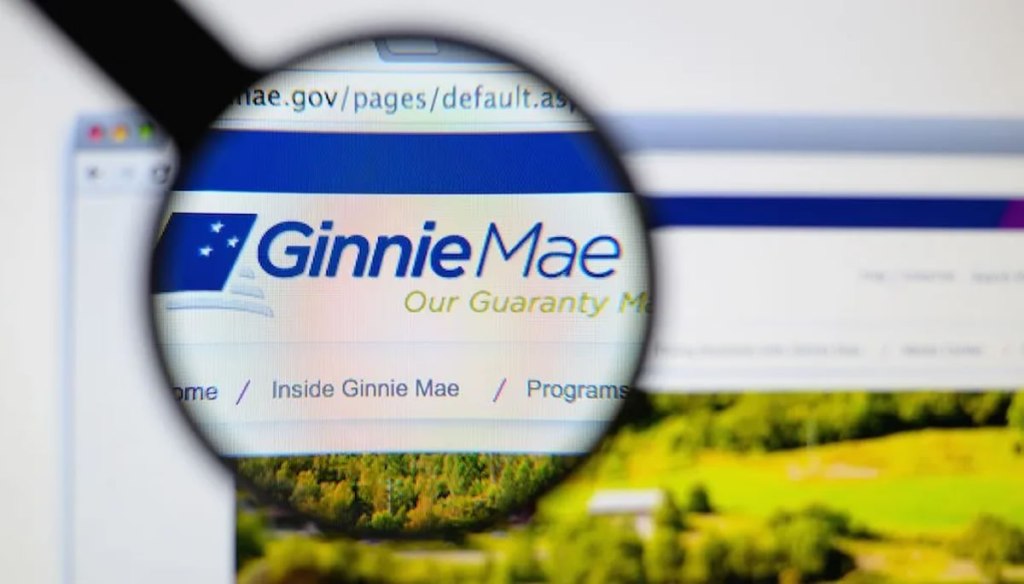After a long period of silence and extensions granted by the U.S. District Court for the Northern District of Texas, Ginnie Mae has filed its response to a lawsuit brought against it by Texas Capital Bank (TCB) saying the warehouse lender lacks standing and discounts the authority the government has to extinguish a lender from its reverse mortgage-backed securities program. Ginnie Mae is seeking dismissal of the complaint in its entirety.
In the initial October complaint, TCB alleged that the government-owned company “extinguished, in return for no consideration, TCB’s first priority lien on tens of millions of dollars in collateral” stemming from the Federal Housing Administration (FHA)-sponsored Home Equity Conversion Mortgage (HECM) program.
Ginnie Mae: loans are our ‘absolute property’
In a filing to the court submitted on Wednesday, Ginnie Mae — using its official acronym “GNMA” in court filings — said that TCB cannot challenge the authority the company maintains over the reverse mortgage securities program.
“When [RMF] defaulted on its obligations, GNMA exercised its right to extinguish RMF’s interest in certain mortgages in order to ensure the timely payment to investors in securities backed by those mortgages,” the filing reads. “Plaintiff [TCB] also had an interest in those mortgages — prior to extinguishment — because RMF had pledged its limited interest in those mortgages to TCB as collateral for a loan.”
TCB’s interest, Ginnie Mae said, “derived entirely from RMF.” But by exercising its authority to extinguish RMF’s interest, Ginnie Mae “necessarily eliminated TCB’s interest as well,” attorneys for the government explained. “By law, the mortgages were the ‘absolute property’ of GNMA.”
TCB “ignores that each of the relevant authorities” underpinning the core elements of the dispute corroborate that Ginnie Mae “had a right in the event of default to extinguish the issuer’s interest in the mortgages and related interests,” including Ginnie Mae’s charter statute, implementing regulations, RMF’s contracts with both Ginnie Mae and TCB and bankruptcy court orders.
These elements “repeatedly and unambiguously disclosed that GNMA had a right in the event of default to extinguish the issuer’s interest in the mortgages and related interests,” government attorneys said. “TCB’s contract with RMF and the bankruptcy court order also expressly stated that TCB’s right to a lien was subject to GNMA’s extinguishment rights.”
Since TCB is “a sophisticated entity with substantial experience in this field and was well aware of and familiar with these authorities,” the complaint is “without merit and should be dismissed,” they added.
TCB claims fail ‘as a matter of law’
In its original complaint, TCB took issue with the extinguishment based on its interest in HECM-backed Securities (HMBS) tails, or “the additional amounts added to the balance of the HECM over time,” the attorneys explained. Ginnie Mae, however, says that TCB is attempting “to draw a distinction between the original principal balance” and the tails, which is an argument the government claims is unsupported.
“[T]he plain text of the statute, regulations, and agreements authorize GNMA to extinguish all interests in the HECMs, and the tails are part of the HECM,” the filing said. “To extinguish all interests in the HECMs necessarily includes extinguishment of any interests in the tails.”
Included in the filing as attachments are the guaranty agreement for the Ginnie Mae HMBS program, a declaration in support of the government’s position by Ginnie Mae’s SVP for the Office of Issuer and Portfolio Management, a document detailing conditions of default in the program dated Oct. 31, 2022, special requirements for HECM reverse mortgage loan pools, TCB’s tail agreement and documents from RMF’s bankruptcy case unfolding in the U.S. District Court for the District of Delaware.
TCB’s position, recent hearing
In a statement submitted to RMD in October, representatives for TCB said that Ginnie Mae has refused to honor prior agreements and legal obligations by failing “to desist from its unlawful seizure of collateral that rightly belongs to [TCB].”
A failure to take action, TCB claimed, would harm the bank itself, but would also “have a chilling effect on the industry, including the ability and willingness of Texas Capital and others to participate in programs like this one,” the October statement said. “Ultimately, the victims of Ginnie Mae’s unlawful action will be the seniors who rely on the reverse mortgage program to pay basic expenses.”
TCB asserted in its original complaint that in March 2023, “the FHA’s current Commissioner, who also holds the title of Assistant Secretary of Housing And Federal Housing Commissioner at [the U.S. Department of Housing and Urban Development (HUD)], stated that FHA disagrees with Ginnie Mae’s position.”
On Wednesday, a hearing was held before Magistrate Judge Lee Ann Reno, who ordered that the government and TCB are required “to file either an amended joint proposed scheduling order or other advisory on or before Jan. 17, 2024.”
TCB previously detailed that it hopes to reach an amicable settlement with the government. Previously, a representative for HUD advised RMD that it does not comment on active litigation.





